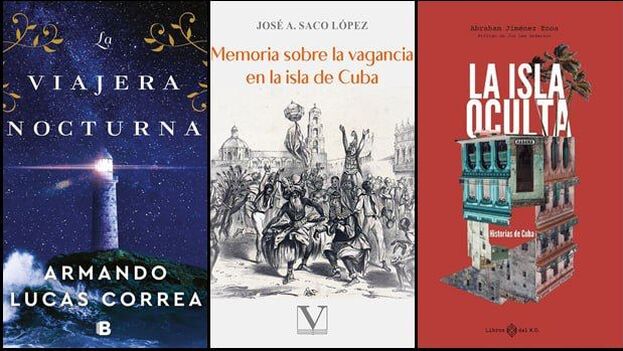
![]() 14ymedio, Madrid, 1 February 2023 — Spanish and Latin American bookshops have already taken delivery of the latest titles by Cuban authors — writers such as Armando Lucas Correa, Abraham Jiménez Enoa and Joel Franz Rosell. Reissues of earlier editions and books by new young writers have also appeared this January. After consulting with a number of publishers and reviewers, 14ymedio offers here a selection of the new editions of 2023.
14ymedio, Madrid, 1 February 2023 — Spanish and Latin American bookshops have already taken delivery of the latest titles by Cuban authors — writers such as Armando Lucas Correa, Abraham Jiménez Enoa and Joel Franz Rosell. Reissues of earlier editions and books by new young writers have also appeared this January. After consulting with a number of publishers and reviewers, 14ymedio offers here a selection of the new editions of 2023.
The Morro lighthouse that overlooks Havana’s port features on the cover of La viajera nocturna (The Night Traveller) (Ediciones B), Armando Lucas Correa’s most recent novel. The book is an emotive exploration of the connections between the individual and history, through the eyes of four women in constant displacement during the twentieth century.
From 1930s Nazi Germany to Batista’s Havana, Correa tells of human beings’ will to survive, and how family memories play a part in the decisions of his protagonists.
The journalist Abraham Jiménez Enoa, who has just won the Michael Jacobs Scholarship for Travel Writing with a project about his first year in exile, publishes La isla oculta (The Hidden Island) (Libros del K.O) – a collection of articles with the subtitle Historias de Cuba (Cuban Stories). Jiménez Enoa follows the trail of some of the characters who remain part of Havana life, like the gigolo who’s main aspiration is to leave both his country and his profession, or the suicide who tries to recover a sense of meaning in a harsh city.
Speaking about The Hidden Island, in an interview with Jorge Ramos the author said “What I’m trying to show is the subterranean Cuba, that everyday Cuba which everyone knows, where scarcity happens for a reason, shortages, lack of medicine and lack of human rights — all happen for a reason. After having put together this ’compendium’, it’s obvious to me why people are leaving Cuba”.
Joel Franz Rosell, already known as an author of classic children’s literature in Cuba, won the French Ville de Cherbourg prize in 2000 with his novel Mi tesoro te espera en Cuba (My Treasure Awaits You in Cuba), re-published this month by Verbum. A little girl’s trip to Cuba has the secret motive of searching for a supposed treasure which her great grand uncle hid on the island before escaping from Castro in 1959. The publisher presents it as a story of “adventure, mystery, complicated romance and a variety of challenges to the bonds of friendship”.
This month the same publisher revived the historical and perceptive Memoria sobre la vagancia en la Isla de Cuba (A Report on Vagrancy on the Island of Cuba), by José Antonio Saco. This book, one of the most brutal nineteenth century analyses of Cuban society, discussed the vices, customs and interests of the Creole people, and proposed a way of better organising the country.
With the collection of poetry Los dias (The Days) (Homagno), the Camagüeyan writer Mario Ramírez continues the work he began in 2019 with his book Corolarios (Corollaries). “Romantic experience, all of the plans made over time that go on to trip us up, our resources of faith or of intelligence, this or that truth or doubt — all these, according to Rafael Almanza, are Ramírez’s themes, whose conclusions are that, in the middle of a dismal-seeming reality, there will still be, nevertheless, “a lyre” (musical instrument).
The novel Náufrago del tiempo (Time’s Castaway) (Verbum), by the writer and 14ymedio columnist Xavier Carbonell, is a meditation on the Island’s destiny, a “fable” — according to literary critic Roberto González Echevarría — whose protagonist encounters “a labyrinth of symbols, lost paradises, monasteries, pirate ships and ruined cities”.
Since the pandemic the Island has suffered a publishing crisis, and, although a recovery might be signalled by the 31st Havana International Book Fair (the Cuban Book Institute promised to market 4,000 titles), it’s unlikely that the work of Cuban publishers will be in the forefront of the event.
Dedicated to Colombia this year, as an invitee country, and to the theme of “inclusive reading”, the fair will be held during the period 9-19 February in its regular settings: in San Carlos de la Cabaña castle and its surroundings, and in Havana’s Historic Centre.
Among the hundred-year-old writers who will be celebrated at the event are Fina García Marruz – who died in 2022 aged 99 — and the geographer and explorer Antonio Núñez Jiménez. Homage will also be paid to Julio Travieso Serrano, recipient of the 2021 National Literature Prize, and the librarian Araceli García Carranza.
During the fair, the winners of the 2023 Alejo Carpentier Prize and the 2023 Nicolás Guillen Prize will be presented. The 2022 storytelling winners were Rogelio Riverón, for Cuarenta vasos de vodka (Forty Glasses of Vodka); Francisco López Sácha, for the novel Voy a escribir la eternidad (I’m Going to Write Eternity); and Joaquín Borges Triana, author of the essay Socorro, no soy subversivo (Help! I’m Not a Subversive). The winner of the Nicolás Guillén Prize was Carlos Esquivel, author of the poetry collection La guagua de Babel (The Babel Bus).
Translated by Ricardo Recluso
____________
COLLABORATE WITH OUR WORK: The 14ymedio team is committed to practicing serious journalism that reflects Cuba’s reality in all its depth. Thank you for joining us on this long journey. We invite you to continue supporting us by becoming a member of 14ymedio now. Together we can continue transforming journalism in Cuba.
